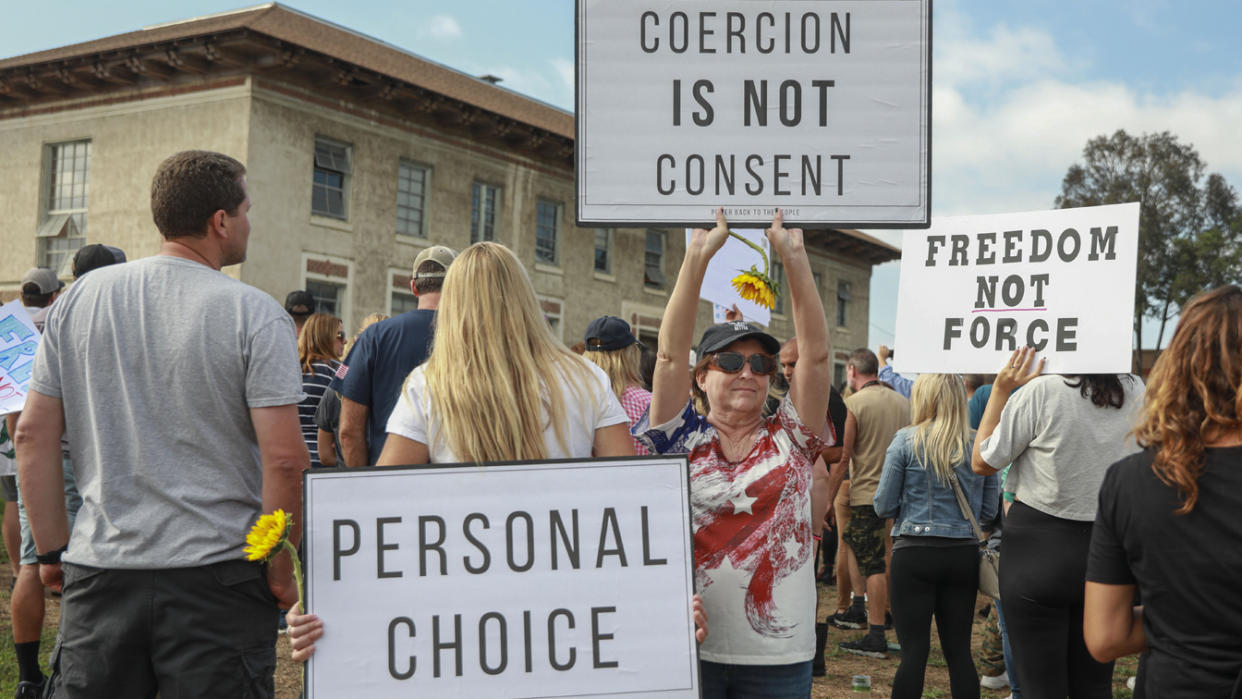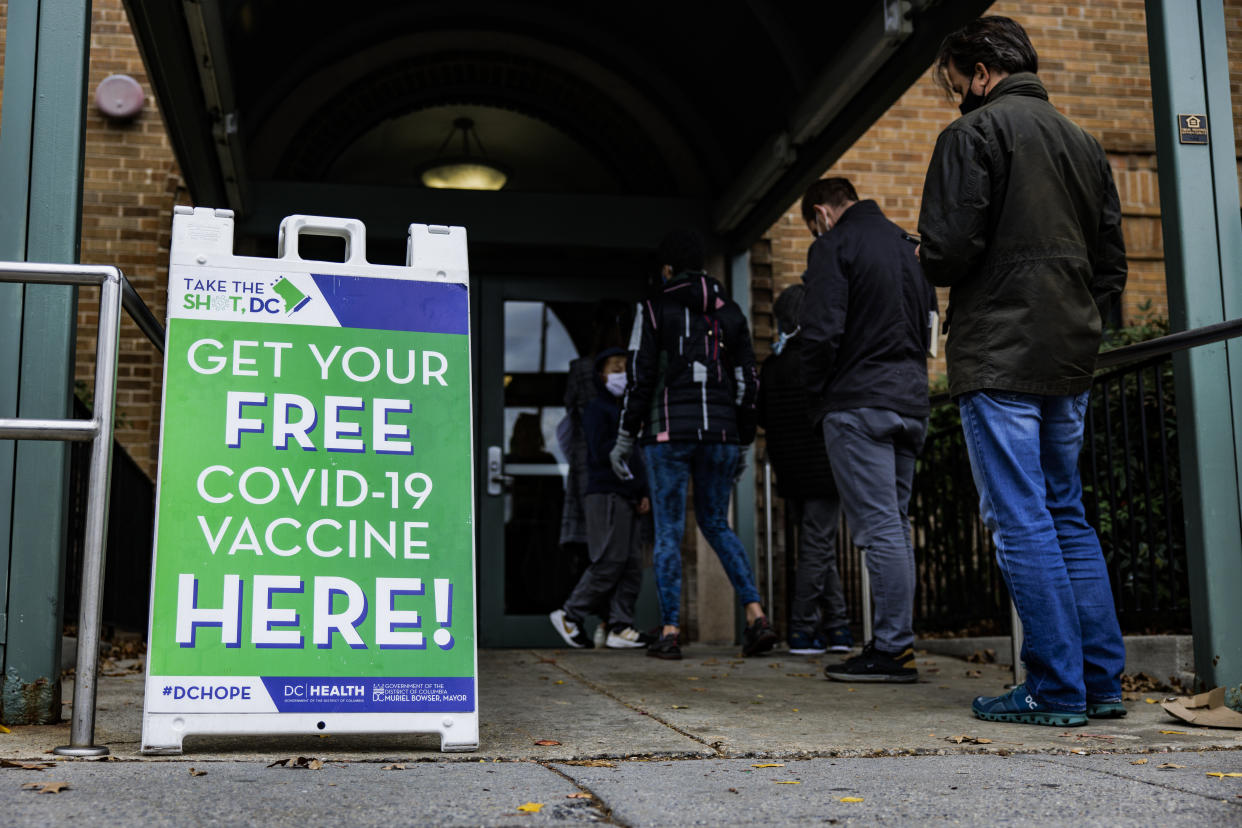Poll: As Omicron looms, a growing number of Trump voters oppose even 'encouraging' vaccination
As the heavily mutated Omicron variant starts to spread across the U.S., more Donald Trump voters now say they oppose officials “encouraging” Americans to get vaccinated than say they support such encouragement, according to a new Yahoo News/YouGov poll.
That’s a sharp reversal from earlier this fall, when 2020 Trump voters favored a policy of vaccine encouragement by a nearly 20-point margin — and a worrisome sign of declining trust in COVID-19 vaccination among conservatives at a time when public health officials say all adults should be scheduling their booster shots.

In September, Trump voters largely opposed vaccine mandates, and they continue to oppose them today. Still, a full 54 percent of Trump voters said back then that they would favor a gentler approach, that is, “encouraging as many people as possible to get vaccinated” in their area in response to “a new wave of COVID-19 cases” triggered by the hypercontagious Delta variant, which was beginning to spread. Just 35 percent were opposed.
But Yahoo News and YouGov’s latest survey of 1,558 U.S. adults, which was conducted from Dec. 9 to 13, found that nearly half of Trump voters (48 percent) now oppose encouraging vaccination in response to Omicron. Fewer (41 percent) say they support doing so.
Among Trump voters, that represents a net shift of 26 percentage points against encouraging vaccination in just three months.
Republicans as a whole are now evenly divided over such encouragement, with 45 percent in favor and 43 percent opposed. In September, those numbers were 54 percent and 35 percent, respectively.
In contrast, most Americans (60 percent) — including nearly all Democrats (85 percent) and a clear majority of independents (59 percent) — still favor encouraging as much vaccination as possible.
Experts say promoting vaccination is the right policy.

Despite reports of mild illness from South Africa, where Omicron was first detected, it’s still unclear how the fast-spreading new variant will affect people who either are unvaccinated or lack fresh antibodies from a recent COVID-19 infection — especially if they’re older or otherwise vulnerable.
According to initial studies, however, people with boosters or hybrid immunity (infection plus vaccination) seem as if they could be sufficiently protected from Omicron — even if it does evade some antibodies.
“When you hear, ‘Omicron, no big deal because this is a mild disease,’ understand that for some, that is true — but not for all,” explained Ashish Jha, dean of the Brown University School of Public Health. “That’s why [it’s] critical to get first and second shots for as many unvaccinated as quickly as possible and third shots for everyone else.”
Yet while some Americans are moving in the right direction, others are not. A full 85 percent of 2020 Joe Biden voters, for instance, say they either have already received a booster shot (57 percent) or would get one if available (28 percent). Just a third of Trump voters say the same (23 percent “already received”; 10 percent “would get one”). Meanwhile, 40 percent of Trump voters remain unvaccinated, nearly six times the number among Biden voters (7 percent).
And so far, Omicron is not changing many minds on the right. More than three-quarters (76 percent) of unvaccinated Trump voters say the variant “makes no difference” in terms of their likelihood of getting vaccinated; two-thirds (66 percent) of unboosted Trump voters say it makes no difference in terms of their likelihood of getting boosted. In comparison, nearly two-thirds (63 percent) of unboosted Biden voters say Omicron makes them more likely to get a booster shot.

The poll suggests two reasons for what appears to be growing disillusionment with COVID-19 vaccination among conservatives. The first is that 77 percent of Trump voters — and 71 percent of Republicans overall — now see the coronavirus as either “a small threat” or “no threat” to themselves; 6 in 10 Trump voters — and half of Republicans — also see it as a small threat or no threat to America as a whole. Among Biden voters, those numbers are 39 percent and 6 percent, respectively.
The second reason is that, while many no longer see COVID as a threat, misinformation about the nonexistent dangers of the vaccines remains widespread. As a result, a full 47 percent of Trump voters now say the vaccines pose “a greater risk” to their health than the virus, up 16 points since September. On the question of which poses a greater risk to America, the same voters are now evenly divided — within the margin of error — between the virus (41 percent) and the vaccines (38 percent). In September, Trump voters saw the virus as the greater risk by a 16-point margin.
(Complicated headlines about Omicron’s abilities to evade immunity and spread among the vaccinated may be contributing as well — even though early studies show that the more vaccinated and boosted people are, the more they’re protected against infection, transmission and severe disease from Omicron.)
Waning conservative trust in vaccination could prove problematic as Omicron spreads. Right now, Americans are not inclined to change their behavior to guard against the new variant. Before Thanksgiving — and before Omicron was detected — 74 percent said their lives had returned to normal, “considering the impact of COVID-19.” Today, 76 percent of Americans say the same. Similarly, the number of Americans (57 percent) who now report wearing a mask “always” or “most of the time” over the past week has not changed since Omicron first manifested.

Likewise, Yahoo News and YouGov asked in late September about a series of potential policies that could be implemented to shield Americans from Delta; they then asked the same questions about Omicron in the latest survey. The most popular policy then — "making in-home testing kits cheaper and more available” — is just as popular now (72 percent favor) as it was then (74 percent). However, support for many other mitigation policies is now significantly lower, including "schools going remote” (33 percent favor, down from 42 percent); “closing indoor dining” (25 percent favor, down from 32 percent); "requiring as many people as possible to get vaccinated” (49 percent, down from 54 percent); and “requiring proof of vaccination inside bars, restaurants and gyms" (45 percent, down from 50 percent).
Some of this makes sense: The more Americans who get boosted and vaccinated (including kids), the more will (and should) feel justified returning to normal.
But the problem is that a variant that infects even vaccinated and recovered people as rapidly and readily as Omicron doesn't need to boast “a great degree of severity” or completely evade vaccines to inflict a great degree of damage. It just needs to keep spreading until it reaches the vast number of people worldwide — and in the U.S. — who are still susceptible to hospitalization and death.
Right now, only about half of Americans over 65 — the most at-risk group for hospitalization — have gotten a booster shot. Thirteen percent are still not fully vaccinated. That’s 7 million seniors.
All told, just 21 percent of U.S. adults have been boosted. More than 40 million, meanwhile, haven’t even gotten a single COVID vaccine shot yet.
And as the latest Yahoo News/YouGov survey suggests, these vulnerable Americans tend to be concentrated in certain communities. According to a new NPR analysis, people living in counties where Trump won at least 60 percent of the vote in 2020 were 2.73 times as likely to die of COVID after vaccines became widely available in May of this year than residents of similarly pro-Biden counties; in October, the reddest 10th of the country saw death rates that were six times higher than the bluest 10th.

That’s why public health officials say this is the wrong moment to ease up on encouraging vaccination — regardless of whether pro-Trump conservatives are increasingly tuning them out. Though Americans are now twice as likely to say the media is “overreacting to the actual risks” of Omicron (32 percent) as to say most Americans are doing the same (16 percent), at least some recognize the danger posed by the fastest-spreading variant yet.
Before Thanksgiving — and before Omicron — 48 percent of Americans said “the worst of the U.S. pandemic is behind us.” Today, that number is 10 points lower (38 percent). But while more Americans are now aware of Omicron and worried about it (48 percent) than not worried about it (37 percent), even those numbers pale in comparison to the number who said they were worried about Delta in July (57 percent) and August (65 percent).
_____________
The Yahoo News survey was conducted by YouGov using a nationally representative sample of 1,558 U.S. adults interviewed online from Dec. 9 to 13. This sample was weighted according to gender, age, race and education based on the American Community Survey, conducted by the U.S. Bureau of the Census, as well as 2020 presidential vote (or non-vote) and voter registration status. Respondents were selected from YouGov’s opt-in panel to be representative of all U.S. adults. The margin of error is approximately 2.7 percent.

